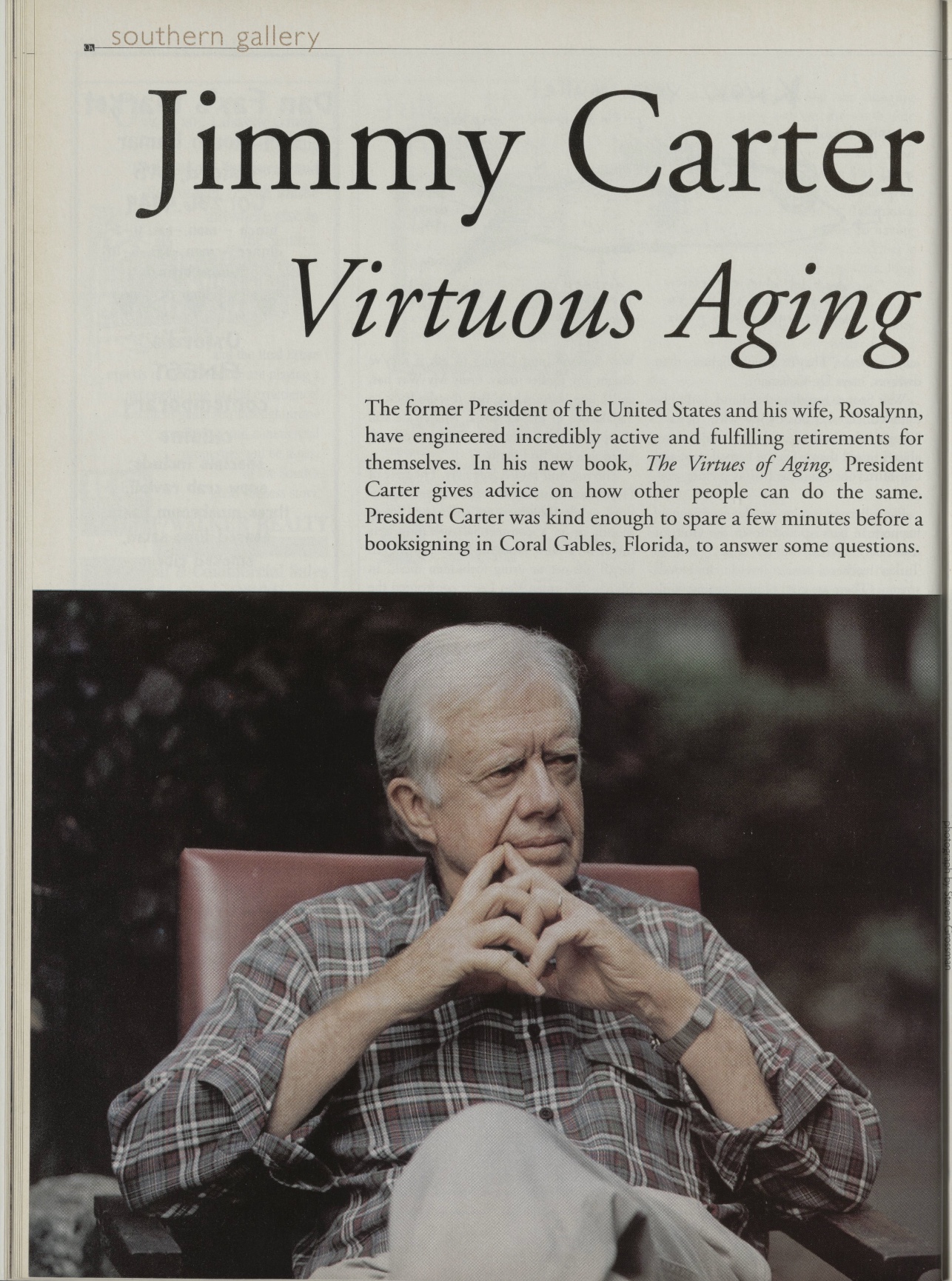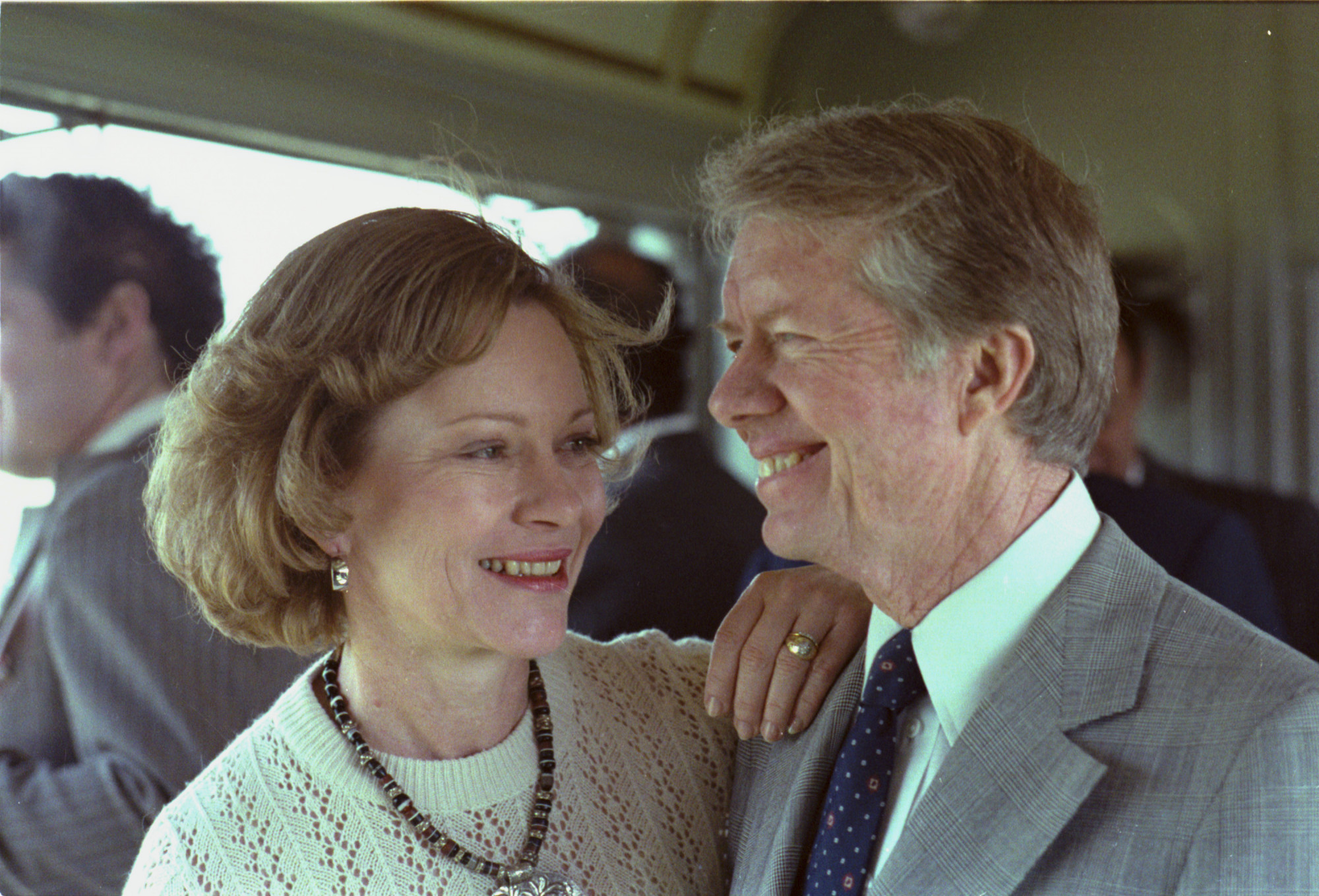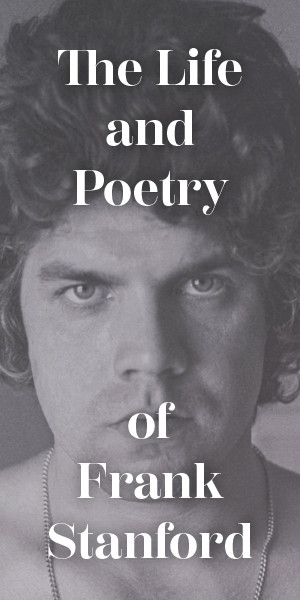An Interview with Jimmy Carter (1999)
An archival Q&A with the thirty-ninth president.
By Oxford American

Oxford American, 1999 Winter Issue
Editor’s Note: This interview originally appeared in the Winter 1999 issue, under the title “Jimmy Carter: Virtuous Aging.” It has been digitized for the first time in memory of the former president, who died on December 29th, 2024 at the age of one hundred.
The former President of the United States and his wife, Rosalynn, have engineered incredibly active and fulfilling retirements for themselves. In his new book, The Virtues of Aging, President Carter gives advice on how other people can do the same. President Carter was kind enough to spare a few minutes before a booksigning in Coral Gables, Florida, to answer some questions.
Oxford American: What prompted or inspired you to write The Virtues of Aging?
Jimmy Carter: I think the main thing that inspired me to write it was an interview I had with Barbara Walters where she interviewed me on my seventieth birthday and outlined all the things that I had done in my life that were challenging, exciting, and interesting. She finally asked, “What’s the best time of your life?” I really hadn’t thought about it before, but I came to realize that the best time of my life is now, after retirement and when I’m seventy-four years old. I also came to realize that an American spends more than half their adult life in retirement and that many people fear that time and don’t make the proper preparations to face those years, and don’t realize that we have almost total freedom to make the choices about the things we do. Whether we are rich, sick, or in very good health or not, we still have great opportunities to lead a very good life.
Did you ever have to struggle with the aging process to reach the seemingly content stage that you are at right now?
Oh yeah, I had no idea what I was going to do once I grew older. President George Bush and I are the same age; we were born in the same year. He was twelve years older than I was when he finished his term in the White House—I was fairly young. President Clinton will be a little bit younger than I was when he finishes his second term. So I came to realize that I had twenty-five more years to live, what was I going to do with it? I was going to grow older; I didn’t have a job, didn’t have any prospect of getting a job. I never had been an author; I never had been a professor. I didn’t know what I was going to do. So I had to face the prospect of growing older without any purpose in life in a tiny community in a fairly dormant state, and it was only because Rosalynn and I sat down and analyzed our talents, our abilities, our opportunities and how to take advantage of them that we have been able to have a very adventurous, unpredictable, enjoyable retirement life.
Do you feel you accomplished more while you were in the White House or after you got out?
In many ways, after the White House. When you are in the White House, as President Clinton and President Bush and I know, you are dealing with “macro-subjects.” A broad range of subjects: the Cold War; how do you deal with the Soviet Union; how do you promote peace in the Middle East; how do you deal with the suffering in your own country, with people who are on welfare, who don’t have an education, who don’t have good housing; what should you do to cement relationships with China; how do you prevent a global war from breaking out; how do you deal with the Congress; how do you prepare for your budget for the coming year; how do you modify the welfare laws. But after I left the White House, I began to deal with what I like to call “micro-things.” We now have, through The Jimmy Carter Center, projects in thirty-five African nations. We go to Africa once or twice a year to aid needy countries, and we are in the villages in Africa, we are in the homes of Africa, we are in the fields of Africa, immunizing children, eradicating disease, preventing blindness, teaching small farmers who have two acres of land how to grow more corn, rice, wheat, or sorghum. We are learning how those people live. We are learning how to prevent a civil war from breaking out in those countries. We are invited to go in and hold an honest, democratic election to end a totalitarian dictatorship. We are immersed in things that when I was president I never would have had an opportunity or an obligation to address. We have a basic guideline at the Carter Center that we don’t duplicate what others are doing. If the World Bank or the U.N. or the U.S. government or Harvard University is doing something, we don’t do it. We just fill vacuums, and a lot of the vacuums that open up to us really involve the alleviation of suffering and the promotion of human rights, democracy, and freedom for many people on earth. And that’s a kind of detailed relationship with human beings that is impossible for the best of presidents to understand or to address.

Jimmy Carter Library ©, The Carter Center
If one were asked what young people can do to better themselves, one can say: turn off the TV, read more, find fulfilling work, etc. What can older folks do to better themselves?
I think the answer is pretty much the same. It’s disturbing to some degree that so many hours out of the week are spent by older people sitting in front of a television screen like a vegetable—not eating properly, not getting any exercise, not expanding our life’s breadth of awareness, not meeting new friends, not utilizing the friendships that we have, not knowing what goes on in our own community, becoming more and more dependent on others to meet needs that we are able to meet ourselves, not having new adventures, not stretching our minds, not stretching our hearts to encompass more knowledge of God’s work, not doing anything that we consider to be worthwhile. And in the process of dormancy, our lives begin to close in on us. We live in a smaller circle of awareness and begin to restrict the number of contacts we have with human beings to fewer and fewer, and we don’t utilize what talents we have. So I think that’s a case not only with young people but with older people.
You describe a lot of your adventures in the book, but what has been the most exciting adventure that you have had since leaving the White House?
Well, I think the most unpredictable and gratifying thing we have done was to form the Carter Center. I never dreamed of having the Carter Center when I left the White House. It’s an organization that now has a beneficial impact on many countries. The other thing, though, that has been most surprising is how much enjoyment we’ve had in doing new things. We had never been birdwatchers. Rosalynn had never played a game of tennis. We had never climbed a mountain. We had never skied down a slope. I had never been a furniture maker. I had only written one small book. I had never taught a college course. All of those things have been brand-new to us, and all of those things took place after we retired. The point is that, for any retired person, there’s an almost unlimited menu from which to choose, if you are just inquisitive and have a moderate degree of self-confidence and courage.
Do you look at John Glenn’s recent space flight as a publicity stunt or an event that symbolizes something else?
I claimed at first that John Glenn made his space flight to promote my book, because my book came out the same week he made his space flight, and he proved that there is life after retirement, that somebody in their seventies can have a notable achievement. I think that what John Glenn accomplished has been very good for our country, almost as beneficial an impact on the space program as his first flight when he made his first trip around the Earth. I think John Glenn has shown that older people still have a contribution to make. And I think that the fact that there were several million people who drove to Florida, or watched on television this one man willing to take a chance at such an advanced age, has shown there is a renewed sense of patriotism and pride in our nation.
I was surprised to learn that you and Gerald Ford have become close friends. Was there any sort of tension you both had to overcome?
[Laughter.] Oh yeah, there was a lot of tension, because he was the incumbent president, certainly hoping for a full term of his own when I ran against him and was the winner. He had to leave the White House after less than three years in office. So there was a strain between us at the beginning. Later, however, Gerald Ford and I went together to the funeral of Anwar Sadat—we went on the same plane over there and back. On the way over, we were just polite to each other, but on the way back, we had a chance to talk for about seven or eight hours, and we shared experiences and realized that we had a lot in common. And since then, he and I have become probably the closest of friends, maybe the closest between two former presidents in history. He visits my library; I visit his. We help each other with projects we are carrying out. We talk to each other on the telephone. Betty and Rosalynn have become good friends. Our children know each other. So we have developed into the kind of friends that are very valuable to each other. When an important issue comes up, such as the impeachment question concerning President Clinton, Gerald Ford and I just naturally telephone each other to discuss what we think about the situation. And when a question comes up about the Gulf War or the Mideast peace process, things that affect the incumbent president, we discuss it with each other. We have gotten so that when we are talking and riding in an automobile, we don’t want to see the car get there, because we want to talk a little bit longer. It’s gotten to be a very close relationship. He’s a great man in that he was able to get over his defeat and open himself up to our friendship.
In light of the scandals of the Clinton White House, do you now think the integrity of the office would have been better served had Bob Dole been elected president?
I wouldn’t say that. I think that President Clinton has been severely punished for what he did. No matter what he achieves in his term of office in the matter of practical things, he will carry the stigma through his lifetime and down through history of what has been revealed and what he has confessed to have done. But I have to add that I don’t think that the office of the presidency has been permanently damaged. I think there will still be a reverence for the president himself, and there will certainly still be a feeling that the White House is a fairly sacred place, having been the home of Franklin Roosevelt, Harry Truman, Abraham Lincoln, and Thomas Jefferson. The history of the presidency will still prevail. And I hope, and I really believe, that President Clinton can still have a very good and productive life, not only after he finishes out his term, which I think he certainly will, but in his retirement years.
Can you briefly say something about the Southern-based novel that you are working on?
I am writing a novel of the Revolutionary War period, and I’m making fairly good progress on it. It will be a fairly long and extensive novel. I’m now more than halfway through with it—I’ve probably written more than 110,000 words. It’s taking good shape in my mind. I haven’t got an editor yet. I wanted to do my thing first, and then I’m very eager to have an accomplished editor give me advice on how to finish it.
Besides the novel, do you have any other new goals up your sleeve?
Later, when Rosalynn and I cut back on the time we spend at the Carter Center, which is now quite extensive, I’d like to do a few more things. One is, I used to paint oil paintings, and I would like to go back and become more of an accomplished painter. Also, I might write another book of poetry. I continue to write even when I’m at my busiest times. I want to do some improvements on my farmland. I want to continue to plan how to leave my estate to my children, grandchildren, and maybe even great-grand- children. I want to allocate a portion of my financial estate to carrying out the projects that we find to be valuable in our lifetime at the Carter Center, perhaps some others. There are a lot of things I have on the agenda for the next several years that will be filling enough to keep me occupied and keep me challenged.




